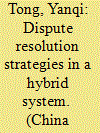| Srl | Item |
| 1 |
ID:
088689


|
|
|
| 2 |
ID:
099267


|
|
|
|
|
| Publication |
2010.
|
| Summary/Abstract |
The lack of electric power in isolated communities in the Brazilian Amazon region has become one of the barriers to economic and social development. Currently, the main technologies that provide electric power to these communities are diesel generators. This non-renewable energy source, besides causing serious problems to the environment and human health, have high maintenance and operational costs. This paper presents a study on the use of photovoltaic and fuel cells for continuous supply of electric power. The paper outlines the technical and costs characteristics of a pilot project set up in an environmental protection area, located in the state of Tocantins, Brazil. The pilot project uses solar energy as the primary electric power production source. Surplus energy stored in the hydrogen produced by the electrolysis of water is later transformed into electric power by the fuel cells during periods when there is little or no sunlight. A comparative study between the technologies and potential configurations meeting the needs of isolated communities in the Amazon through simulations based on HOMER software are presented. As result, this paper outlines some policies to promote the use of renewable energy sources in isolated areas in Brazil derived from the pilot project.
|
|
|
|
|
|
|
|
|
|
|
|
|
|
|
|
| 3 |
ID:
111405


|
|
|
|
|
| Publication |
2012.
|
| Summary/Abstract |
Renewable energy sources (RES) based stand-alone systems employing either wind or solar power and energy storage comprise a reliable energy alternative, on top of conventional diesel-electric generator sets, commonly used by remote consumers. However, such systems usually imply the need for oversizing and considerable energy storage requirements leading to relatively high costs. On the other hand, hybrid configurations that may exploit both wind and solar potential of a given area may considerably reduce energy storage capacity and improve the economic performance of the system. In this context, an integrated techno-economic methodology for the evaluation of hybrid wind-photovoltaic stand-alone power systems is currently developed, aiming at the designation of optimum configurations for a typical remote consumer, using economic performance criteria. For the problem investigation, the developed evaluation model is applied to four representative areas of the Greek territory with different wind potential characteristics in order to obtain optimum configurations on the basis of minimum initial investment, 10-year and 20-year total cost. According to the results obtained, the proposed solution is favorably compared with all other stand-alone energy alternatives, reflecting the ability of hybrid systems to adjust even in areas where the local RES potential is not necessarily of high quality.
|
|
|
|
|
|
|
|
|
|
|
|
|
|
|
|
| 4 |
ID:
101384


|
|
|
|
|
| Publication |
2011.
|
| Summary/Abstract |
Access to energy is known as a key issue for poverty reduction. Electrification rate of sub-Saharan countries is one of the lowest among the developing countries. However, this part of the world has natural energy resources that could help raising its access to energy, then its economic development. An original "flexy-energy" concept of hybrid solar PV/diesel/biofuel power plant, without battery storage, is performed in this paper. This concept is developed in order to not only make access to energy possible for rural and peri-urban populations in Africa (by reducing the electricity generation cost) but also to make the electricity production sustainable in these areas. For landlocked countries like Burkina Faso, this concept could help them reducing their electricity bill (then their fuel consumption) and accelerate their rural and peri-urban electrification coverage.
|
|
|
|
|
|
|
|
|
|
|
|
|
|
|
|